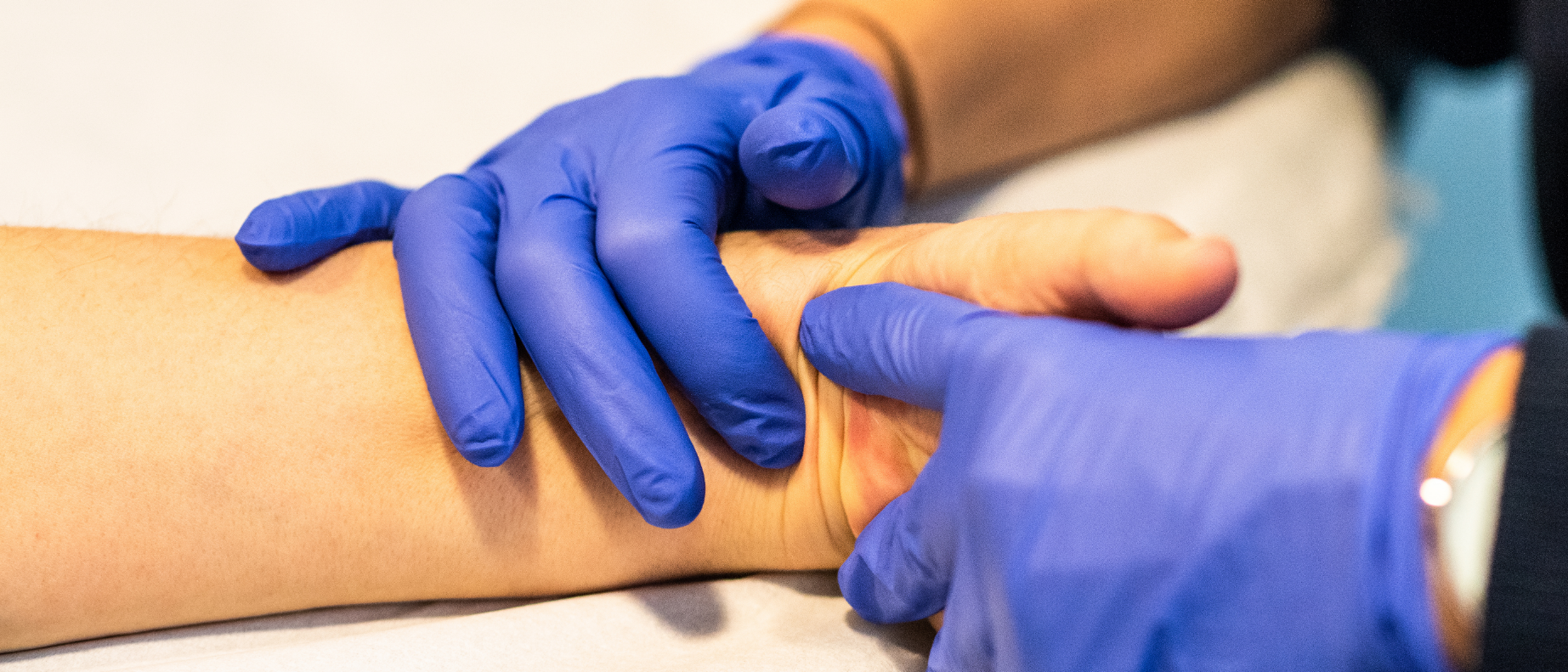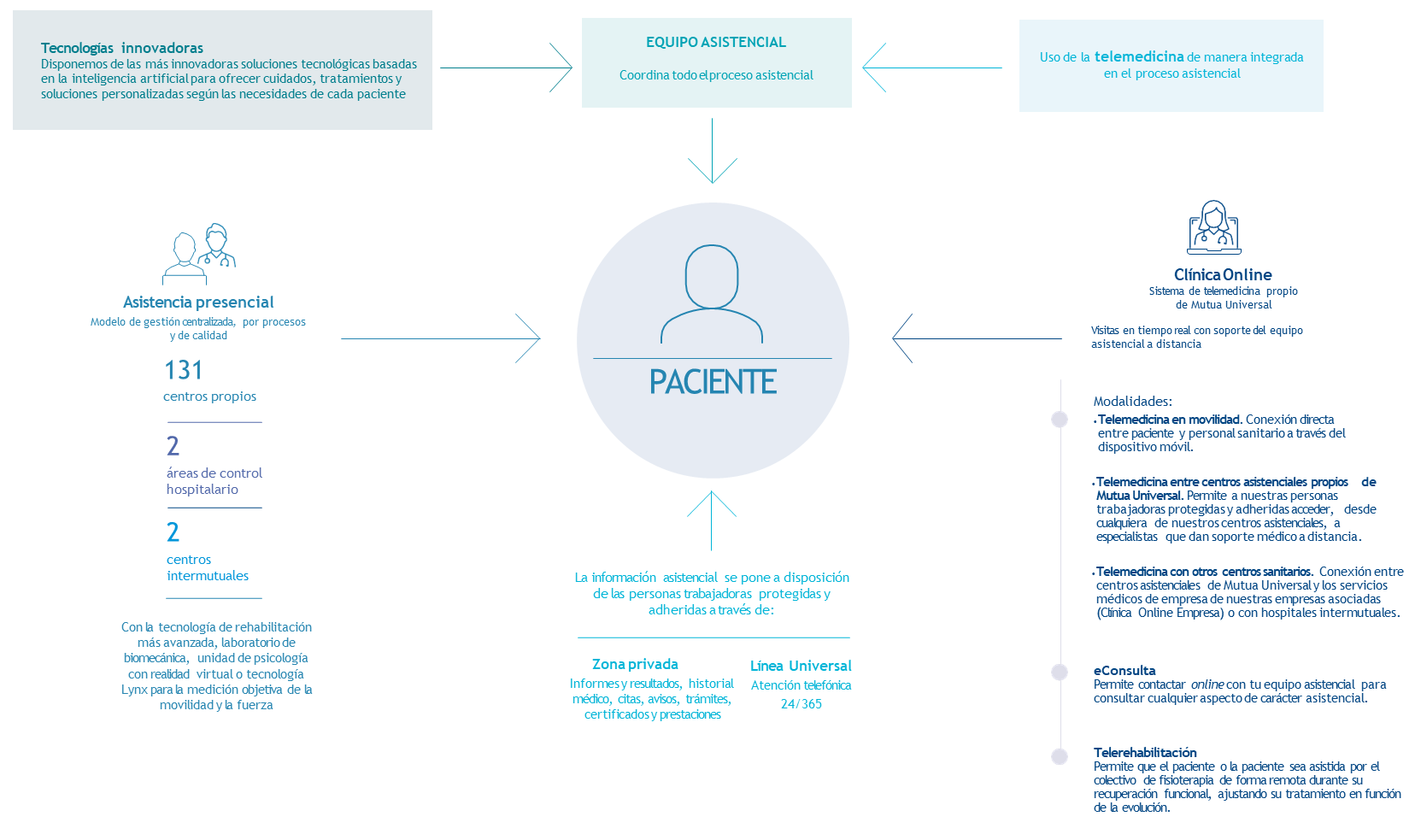Humanised and customised medicine, promoting the technological innovation

Mutua Universal offers a model of health integral based on the humanisation and the customisation in which the patient or the patient is the central axis, with the aim of offering always the solution more suitable to discuss each case with the maximum rigorousness and agility.
Together with the attention in person lent in a broad welfare centre network specific to technological training registration present in all provinces, two hospitable control areas in Madrid and Barcelona and two private hospitals in Bilbao and Valencia, Mutua Universal has an advanced system specific to telemedicine (Online Clinic), implemented in all help centres, that it ensures to the patients and patients the access to the specialised and hospitable medicine regardless of the location.
These resources and services guarantee a customised attention, universal and eficiente in any circumstance.

Customised total management and follow-up
The model of customised attention of Mutua Universal has twofiguras key with complementary works. On one hand, the welfare process is guided at all times for a welfare responsible person that it coordinates everything the process of medical discharge, which it ensures the maximum calm to the person insured worker and associated. The welfare responsible person determines and it coordinates the best treatment, sees about to arrange visits with specialists and it expedites the diagnostic test performance.
In addition, we offer to the companies an only dialogue that they they allow telling at all times with the information more updated to minimise the impact that supposes a leave from work.
Innovation in health technologies
In Mutua Universal work continuously in innovative technologies in the field of the physiotherapy with the aim of improve diagnoses and processing.
LYNX system
Thanks to the system LYNX carry out a complementary evaluation of the mobility and force of different joints of the patients and patients earlier, during and after the processing, which it strengthens the evolutionary assessment and follow-up of pathologies and provides a therapeutic planning chord to needs of each patient.
The system LYNX, based on a software and some medical sensors, is used in the fields of the rehabilitation or physical recuperation, the physiotherapy, the evaluation of injuries, the sport or the research.
Ultrasound scan
The ultrasound scan is a diagnostic non-invasive technique that it uses the ultrasound to define the bodies of the human body, without ionising radiations, real-time, which it allows carrying out dynamic inspections, and with skills of visualising several planes.
It is a tool versatile and lither than other image evidence as the magnetic resonance, very useful for the assessment of the soft parts (tendon, muscle, bursa, ligament, subcutaneous cellular fabric, entrails, peripheral or blood vessels nerves, among others) and cortical bone. In addition, is a fundamental tool in invasive therapies as EPTE, dry or neuromodulation puncture, where the musculoskeletal ultrasound scan does the function of guide and contributes the maximum precision in these processing.
In the workplace this technique is applied in:
- Pathology of the shoulder (pathology of the manguito rotador, bursitis, syndromes subacromiales, injuries glenohumerales, fibroid or tendinitis breakages, among others).
- Assessment of the joint of the elbow and associated musculature (epicondilitis, epitrocleitis, nervous or bursitis ensnarements).
- Study of the doll and its main pathologies (tendinitis, tendinosis, sinovitis, nervous ensnarement in synovial carpal tunnel or cysts, among others).
- Assessment of the knee (cysts, bursitis, sinovitis or injuries tendinous).
- Ankle and foot (injuries ligamentosas, muscular and nervous or fasciitis ensnarements).
Analytic models and predictivos
In Mutua Universal have the more innovative technology solutions based on the artificial intelligence for the advanced and sure analysis of details.
Starting from the study of great quantities of historic information which arrange and of the detection of patterns and trends, design models predictivos that they promote the efficiency in the management and they anticipate situations and processes to help to our health groups to take the better decision-makings adapted to every patient, offering thus an excellent and customised attention.
